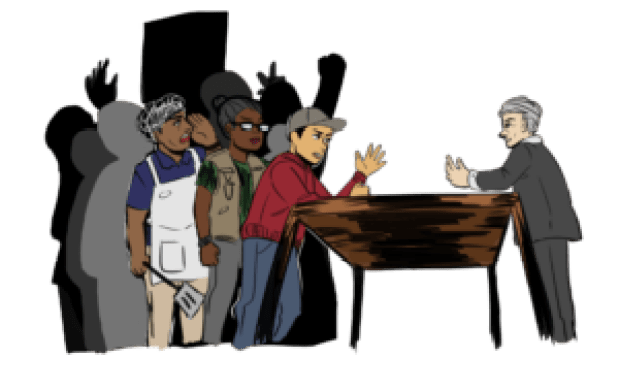UC union workers from across the state will meet at the bargaining table with the UC Board of Regents this week to renegotiate their contracts, which expired 18 months ago. Negotiations will be on Jan. 31 and Feb. 1. If their needs are not met, they are prepared to strike as a last resort.
The UC-wide union, known as the American Federation of State, County and Municipal Employees (AFSCME) Local 3299, represents more than 24,000 workers, from daytime custodians to radiology techs. At UC Santa Cruz, this includes people students rely on everyday — dining hall workers, bus drivers and community safety officers to name a few.
AFSCME 3299 will be demonstrating using picketing, speakers and chants to draw attention to their cause on Feb. 1 at noon in front of the Cowell and Stevenson Dining Hall. The protest will only span the workers’ 30 minute lunch break. The UC Student-Workers Union, UAW Local 2865, will also be in attendance and other students are highly encouraged to join.
“What the protest is really about is trying to fight for [a] culture of equality, security, dignity, and fairness,” said John de los Angeles, communications director of AFSCME 3299. “We believe that culture has been chipped away at under the Donald Trump presidency and with some of these policy proposals [in the past] from the University of California.”
One of these demands is equal pay for student and career workers, which they argue will promote long-term employees.
“That’s important because [if they pay students less], that means they could hire a lot of students, so they wouldn’t have as many workers and that would mean they were taking away jobs,” said Kevin Parks, a UCSC loop bus driver and the UCSC bargaining chair for AFSCME 3299.
Parks hopes to see students and other unions support the AFSCME 3299 demonstration. He hopes the protest will connect students and workers by humanizing the people students interact with every day.
“It’s an escalating thing — strike is the strongest thing that we have,” Parks said. “We can shut down the campus and the medical center […] It also draws the attention of the media, people can be like ‘Why won’t they give their workers even just [a step raise]?’ all that negative press. ‘Meet them halfway, at least be reasonable.”
UC President Janet Napolitano issued a letter to address UC worker compensation stagnation allegations after a state audit in 2017 criticized delegation of funds reserved for worker benefits. UC claims to have proposed market-competitive wages, having raised the wages of some of UC lowest paid workers in recent years, according to the letter. By October 2017, all employees and contract workers of the UC who work at least 20 hours a week earned $15 an hour or more.
According to the statement UCOP issued in June 2016, when the union contract lapsed, the UC offers “excellent health benefits” similar to what faculty receive. As for retirement plans, new employees have a choice between a standard pension or a 401k scheme, whereas current workers would retain their pension. The statement failed to address issues of contracting out and understaffing.
According to The Mercury News, in 2016 several UC-employed contractors were paid wages far below what the 2015 UC policy established. John de los Angeles refers to this year’s state audit to explain the absence of this information.
“We know that the UC doesn’t know the extent of the problem, because there is no data [on it]. We don’t know how many contractors are being abused in this manner, we don’t know if they have access to healthcare, how much they’re getting paid, and so […] there just isn’t enough information,” de los Angeles said.
UC Office of the President (UCOP) further stated that it plans to revise its systemwide guidelines by reviewing contracts more thoroughly and improving its documentation.
“We hope the next steps, including a factfinding phase and assistance from an objective third party in negotiations for our service staff, will encourage AFSCME to come forward with realistic proposals that lead to an agreement,” according to the UC statement.
In the fact-finding phase, an agreed-upon neutral third party will identify unbiased facts regarding the conflict before the UC and AFSCME 3299 make final agreements.
“We’ve both made our proposals, we’ve both made movement on those proposals, and I hope that we can work together to go forward on those to avoid a strike. We don’t want it to come to that — it’s not only hurtful for our workers, but it’s hurtful for our students and it’s hurtful for the general public,” de los Angeles said. “We’re here to work with them, we show up at our bargaining sessions, and we are hoping they are just as willing to bargain as they are.”

